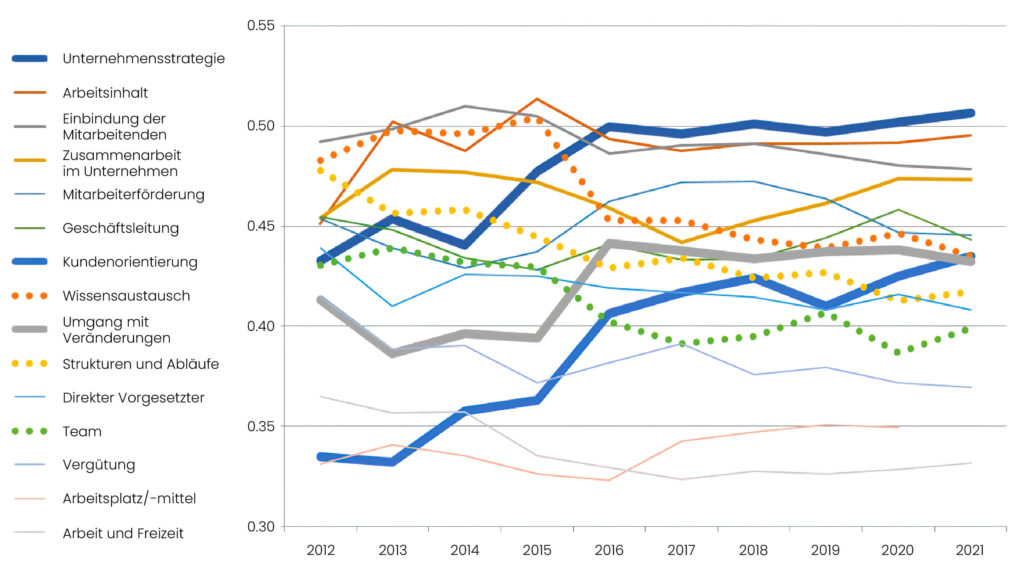Adventure Purpose
Why Purpose needs to be experienced internally as an exciting journey. Our insight from 150,000 data from 25 Swiss companies.
To successfully position corporate brands, Heads Corporate Branding also recorded the ambitions and wishes of employees for 25 Swiss companies over the last ten years using a corporate personality inventory. Comparing the more than 150,000 statements recorded, surprising similarities were found. One of the most important findings: Employees want to be motivated by a precise understanding of the company’s direction and experience this as an exciting, meaningful development.
We were able to identify many desires for change in the companies surveyed, but one desire was present and strongly pronounced in almost all of them: Employees long for more positive excitement. For all the esteem in which they hold their employer – there is apparently a lack of “goose bumps”. Employees want to experience the company in a more exciting, adventurous, and spirited way. This refers less to the challenges that employees face in their daily work and more to the company’s personality: people want to understand where the company is going. And this development should be meaningful and exciting.
The comprehensive study by icommit, which has been examining the employees of more than 120 companies for years regarding their attachment to the company, also points in this direction: Since 2016, job content is no longer the most important driver of attachment. Commitment is nourished by an understanding of the corporate strategy.
Connection with commitment

Source: icommit, Küsnacht
This and many other studies prove how important it is for employees today to recognize the company’s raison d’être. And this “raison d’Être” should, whenever possible, generate excitement and raise the pulse. So companies do well to create clarity about where the journey is going and what the meaning of the company is.
Thomas Höge and Tatjana Schnell from the Institute of Psychology at the University of Innsbruck established this in a research paper back in 2012: No work engagement without sense fulfillment. “When viewed multivariate, the activity characteristic meaningfulness (of the task) to others is the strongest predictor of meaningfulness and work engagement, while autonomy has a considerably weaker correlation.”
The results of our data analysis were presented at a Perikom event in late 2021. Swiss philosopher and publicist Ludwig Hasler fueled our assessments with pointed interventions.
Ludwig Hasler’s thoughts on the topic of meaning and excitement: “If I want to define meaning quite simply, it is about doing something that has meaning not only for me. Something that can improve the lives of others – delighting other people and getting them in shape. By now, I think we’ve all understood that the ego loop doesn’t cut it. True, in all the rankings we Swiss are considered the luckiest, the richest – the most stable even more so. Then also as the most innovative – or at least we finance innovation the most. And now? Do we look like it? Not only since the pandemic, but despite all our good fortune, we do seem rather irritable.”
“Our lives are pretty mundane and thoroughly economized.”
Hasler continued: “And now companies are faced with a task for which they are not traditionally capable: The company must suddenly become a kind of home. This is also because the boundaries between work and private life are becoming increasingly blurred. And because the company demands more and more from its employees – imagination, courage, commitment. That’s why the expectations of the company have also grown. The expectation is to be part of a story that is bigger than each individual. The company must tell what it stands for. You can’t predict the future, but you can anticipate who you want to be the day after tomorrow. The key word, after all, was excitement: People want some drama. We think we’re living in the most colorful time ever, but our lives are mundane and economized. The desired drama is an exciting picture of the future, which the company wants to achieve. What is needed is more intensity instead of external impact. More inward growth. The winner will be the one who succeeds in this.”
Conclusion: The corporate strategy must be communicated to the employees in a clear, convincing, exciting, and meaningful way – as an exciting journey to a meaningful goal. A purpose does not necessarily have to be a promise to save the world. It can suffice if the purpose lies in an extraordinarily high benefit for the customers or the company, which is only made possible by the top performance of the employees.
In the current issue of “Persönlich” you will find the detailed report (in german) on our Perikom event “Performance, Meaning and Desire in Companies”, which you can also read here.

